
Vol. 7, 2020
A new decade
for social changes
www.techniumscience.com
9 772668 779000
ISSN 2668-7798

Considerations on the mechanism used for applying
disciplinary sanctions
Adrian Nicolescu
Faculty of Letters, University of Craiova (Romania)
nicolescu_adrian89@yahoo.com
Abstract. The essential role of the disciplinary sanctions is similar to that of the criminal
sanctions and consists in the future prevention of facts that could affect the labor relations, which
result from the individual employment contract concluded between the employer and the
employee according to the law. In the current labor law, the legislator left within the employer
the power to sanction the employee in the situation in which he violates the discipline of work,
but this possibility is not a non-binding one, but one in strict compliance with the legislation in
force. For the correct application of the disciplinary sanctions, that is to say, without prejudice
to the rights of the employee, no disciplinary sanction, except the written warning, can be
disposed of before carrying out the preliminary disciplinary investigation. Once the employee's
guilt has been ascertained and after carrying out the preliminary investigation in accordance with
the imposed procedures, the employer is able to establish the disciplinary sanction taking into
account the following legal criteria, such as the circumstances in which the act was committed,
the degree of the employee's guilt and, not in last, the general behavior at work. The disciplinary
sanction, in general, in order to be implemented by the employer, must be outlined by means of
a written one, respectively by a sanctioning decision that is communicated to the employee so
that he is aware its provisions, and in certain cases it can challenge an eventual abusive behavior
of the employer. Through this administrative instrument there are clearly described the
deviations of the employee from the labor norms.
Keywords. disciplinary sanctions, disciplinary investigation, sanction decision, authorized
bodies.
1.Introduction
It should be emphasized that the parties of the employment relationship are not on equal footing
for different economic reasons, and the main objective of labor law is to guarantee the
implementation of all rights arising from the individual employment contract, an instrument
which the employer must respect. In the literature it has been stated that the task of labor law is
to protect the employee who is in a subordinated position to the employer, so labor law was
created in order to generate clear mechanisms to ensure respect for an aspect of individual
freedom. [1]
In order to apply the disciplinary sanctions in a correct and coherent way, the legislator
stipulated that the preliminary disciplinary investigation has a major implication in the
prevention of abusive, illegal or unreasonable measures ordered by the employer, who can take
advantage of the inequality of the parties in the labor relations. A central role in the application
122
Technium Social Sciences Journal
Vol. 7, 122-127, May 2020
ISSN: 2668-7798
www.techniumscience.com

of the disciplinary sanctions is the terms of their application and in accordance with art. 252
para. 1 of the Labor Code, „the employer disposes the application of the disciplinary sanction
by a decision issued in written form, within 30 calendar days from the date of taking knowledge
about committing the disciplinary deviation, but not later than 6 months from the date of the
fact commission”.
A particular situation regarding the terms of application of the disciplinary sanctions is that of
the civil servants, and in accordance with the provisions of art. 77 paragraph 5 of Law no. 188
/ 1999ꓽ“disciplinary sanctions shall be applied within a maximum of 1 year from the date of the
notification of the disciplinary commission, regarding the commission of the disciplinary
infringement, but not later than 2 years from the date of the disciplinary infringement”.
2.The competent bodies to apply disciplinary sanctions
As regards the competence of the bodies in applying the disciplinary sanctions of the employees
who deviate from the normal conduct of the labor discipline, the current Labor Code makes no
reference in this respect, the only mention being that it is within the employer's discretion to
apply these coercive measures.
Considering the ones mentioned above, in principle, in the specialized literature it was
appreciated that „the Labor Code does not make any clarification, showing that the disciplinary
prerogative belongs to the employer, without distinguishing between natural and legal persons,
the latter having collective or one-person management bodies. From the point of view of the
disciplinary responsibility, the pre-eminent position is held by the unipersonal bodies (director,
general director, president, administrator), which in the legislator's opinion is the competent
body to be notified with the commission of a disciplinary offense'.' [2]
The legal institution of the delegation may also operate in the case of the application of
disciplinary sanctions, in the sense that the competent body of the employer may empower a
subordinate to apply any disciplinary sanction, even the harshest, respectively dismissal, and
not only the easier ones such as warning or diminution of basic salary.
In practice, the most common situations in which the delegation of disciplinary attributions
operate are as follows: the general director may appoint a general deputy director, a deputy
director, a chairman of the board of directors or an executive director, including the one
responsible for the human resources department. In order to produce effects, the delegation of
disciplinary attributions must meet several conditions:
- to express the will of the employer and to regard only attributions that are not legally
recognized to be exclusive to the employer;
- to be express, or not to result from the very nature of the delegate's work;
- to be precise (in the sense that the general tasks of organization and control, established by
the individual employment contract do not constitute, in the absence of the express delegation,
the prerogative of the one in case to apply disciplinary sanctions);
- to be effective, which means that the employer (more precisely the legal representative) takes
all the measures that allow the person empowered to actually exercise the attributions entrusted
to him;
- to be dated;
- to be accepted, because, on the one hand, it refers to additional tasks compared to the current
ones, specific to the function to the one in question, and on the other hand, it may incur the
responsibility of the delegate.
123
Technium Social Sciences Journal
Vol. 7, 122-127, May 2020
ISSN: 2668-7798
www.techniumscience.com

3.The preliminary disciplinary investigation - pillar of the disciplinary action
In order to limit a bad faith behavior manifested by the employer, the labor law establishes that
the employee can only be sanctioned after a preliminary investigation has been completed.
In the doctrine it was pointed out that the stage of the disciplinary investigation "must be the
result of an analysis undertaken by the employer called legally and in practice the disciplinary
investigation (inquiry)." [3]
As I mentioned before, no measure, except the written warning, can be disposed of before
carrying out a preliminary disciplinary investigation. This rule "has the character of a protective
measure, in order to prevent the application of unjustified disciplinary sanctions."[4]
Also, the Romanian Constitutional Court has ruled in its jurisprudence “that the legal labor
relations must be carried out in a legal framework, in order to be able to respect the rights and
duties as well as the legitimate interests of both parties. In this framework, the disciplinary
investigation prior to the application of the sanction largely contributes to the prevention of
abusive, illegal or unreasonable measures, ordered by the employer, taking advantage of its
dominant situation ... ``
The preliminary research procedure involves several obligatory stagesꓽ
- informing the employer that a certain employee has committed a disciplinary offense;
- the existence of the manifestation from the employer materialized in a disposition to carry out
the investigations addressed to the person or the commission specially empowered by him;
- convocation in writing of the employee for carrying out the investigation;
- the meeting, namely the discussion between the commission and the employee concerned,
with the assurance of the right of defense;
- finalizing the research through a report, a signed statement, which will be submitted to the
employer.
Further, the employer, through his / her legal representative, having been notified of the
commission of the deviation, will order the disciplinary investigation carried out by a
commission set up for this purpose. [5] The disciplinary investigation procedure presupposes
the presence of the employee before the specific commission. According to the provisions of
art. 251 para. 4 of the Labor Code, the employee, taking into account the deed that is imputed
to him from the summoner, on the occasion of the investigation, has the possibility to defend
himself by presenting the evidence and the reasons he considers necessary. The evidence
proposed by the employee before the commission may consist of documents, such as medical
certificates from which his incapacity to work results, other documents to justify the reason
why, for example, he was absent or late from the work program. Also, in principle, the employee
can use in his defense the testimony of some of his colleagues to combat the accusations brought
to him.
The presence of the investigated employee in front of the commission, the discussions that take
place, the evidence administered and the motivations brought must be able to clarify the
situation, to establish the guilt or innocence of the person in question. [6] It was pointed out
that "the activity of disciplinary misconduct requires the establishment of the following aspects:
the circumstances in which the deed was committed; the degree of guilt of the employee; the
consequences of disciplinary misconduct; the general behavior in the employee's service; any
penalties previously applied."[7]
Article 251 paragraph 3 of the Labor Code stipulates that the absence of the employee at the
summons made by the employer without any objective reason gives the right to order the
sanction without carrying out the preliminary disciplinary investigation.
Carrying out the preliminary investigation and implicitly summoning the employee are
obligations established with regard to the employer. Therefore, there is no obligation to require
124
Technium Social Sciences Journal
Vol. 7, 122-127, May 2020
ISSN: 2668-7798
www.techniumscience.com

the employee to participate in the summons, but rather it is his right to attend this summons to
make a concrete and effective defense to combat the guilt.
In the specialized literature, it was clearly emphasized that "drafting in imperative terms the
necessity of listening to the accused and verifying his claims in defense, prior to the application
of the sanction, shows that the legislator understood to make respecting the right to defense a
condition of validity of the sanctioning act itself.`` [8]
We agree with the opinion that the failure to be present at the summons cannot constitute a
distinct disciplinary sanction, but it presupposes that the employee thus understood to waive
the right of defense, in front of the employer, as recognized by law. [9]
There are also practical situations in which the employee's failure to appear before the
disciplinary commission is generated by certain objective reasons, such as temporary incapacity
for work, and thus it will not be possible to sanction the one in question. It was found that during
the period of this incapacity, the individual employment contract being suspended, the deadlines
for applying the disciplinary sanction are automatically suspended.[10]
The doctrine has shown that the employer has the right to suspend the individual employment
contract during the disciplinary investigation.[11]
In conclusion, this prerogative regarding the suspension of disciplinary investigation is not
unlimited in time, but can be disposed of only as long as the investigation lasts and cannot be
extended beyond this duration.
At the end of the preliminary investigation, a report will be drawn up, or as the case may be, a
signed statement by the persons empowered to carry it out, stating its results, including, as the
case may be, the unjustified refusal of the employee to present himself or to motivate his
position, or motivation for which his defenses were not taken into account, the sanction
proposal, the sanction that can be applied. In the case of a dispute, the employer must submit
to the case file the proof of having performed the preliminary disciplinary procedure. Failure to
fulfill this obligation leads to the presumption that this procedure has not been fulfilled.
4.Mechanism of individualization of disciplinary sanctions
Once the employee's guilt has been found, after carrying out the preliminary investigation, the
employer will establish the disciplinary sanction. Thus, the employer applies the disciplinary
sanction considering the following legal criteria provided in art. 250 of the Labor Codeꓽ
a) The circumstances in which the deed was committed;
b) The degree of guilt of the employee;
c) The consequences of disciplinary misconduct;
d) General behavior at work;
e) Any disciplinary sanctions previously suffered by him.
The coherent establishment and application of the disciplinary sanctions cannot take place in
an arbitrary way, but the criteria imposed by the labor legislation must be considered
compulsorily. [12]
Failure to take these criteria into account, according to the Labor Code, automatically leads to
an unlawful and illegal dismissal decision.
Therefore, in all cases, the competent body to apply the sanction, will have to pay full attention
to its individualization, its dosage, taking into account the criteria provided by law, because
only a fair correlation of the sanction with the gravity of the act is of nature to ensure the
accomplishment of the educational and preventive role of the responsibility.”[13]
The disciplinary sanctions are applied gradually, depending on the deed committed and the
degree of guilt of the employee as well as the possible disciplinary sanctions previously
disposed. A central place in the mechanism for applying sanctions is also the level of blame. It
125
Technium Social Sciences Journal
Vol. 7, 122-127, May 2020
ISSN: 2668-7798
www.techniumscience.com


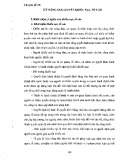
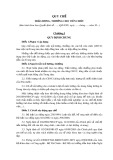
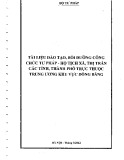
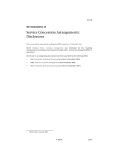
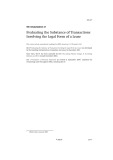
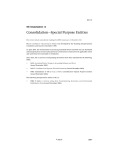
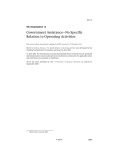
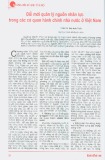
![Quản lý tài chính trong cơ quan hành chính nhà nước [chuẩn nhất]](https://cdn.tailieu.vn/images/document/thumbnail/2016/20161205/thienwru/135x160/4031480920874.jpg)















